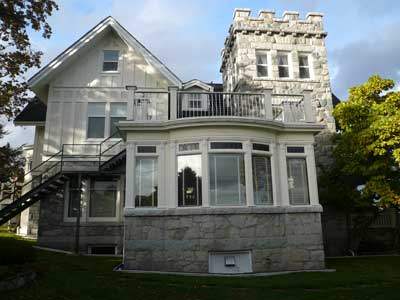ARCHITECTURE:
Henry Sandham Griffith (1865-1943) followed his British Arts & Crafts training and used Tudor Revival and Hall House formulas for his large residential work, of which this is the best example in Victoria. He designed this house near the top of Smith Hill with meticulous attention to detail, even to the landscape. The house is based on a cross-axial plan, with the crenellated tower offset on the east face overlooking Cook St below. The foundation, main floor, tower and chimneys are of local granite, the upper floors of roughcast stucco and half-timbering. Unfortunately, the half-timbering has been painted out, and second floor wooden balusters replaced by flimsy wrought iron, weakening the effect.
ORIGINAL OCCUPANTS:
1911-18: Henry Sandham Griffith (b. Oxford, ENG 1865-1943) and Marie Jane (née Hall, b. Yorkshire, ENG 1864-1948) lived in Fort Garry until 1918. In 1887 Henry came to Winnipeg, where he worked in the Northern Pacific Railway engineer’s office, and later in the Provincial Land Titles office. In 1890, he married Marie, who was living in Kenora, ON. He officially began practising as an architect in 1893, opening his first office in Winnipeg and designing a number of Manitoba schools. In 1906 Henry, Marie and their four children moved to Saskatoon, then to Victoria in 1907. By 1910 Griffith was running architectural offices in both Vancouver and Victoria.
Griffith designed a variety of structures during his career, ranging from skyscrapers to large residences. Some of his commissions still standing in Victoria included the Landsberg residence (106 Medana St, James Bay) in 1910, the Bullen residence (1007 Joan Cr, Rockland) in 1915, the Sweeney & McConnell building, 1010-1012 Langley St, in 1910, the Empress Building, now the Strathcona Hotel, 919 Douglas St in 1911, and the Fairfield Hotel, 1601-1609 Douglas St in 1912. The last three are all Downtown. For the Khalsa Diwan Society in 1912, Griffith designed the Gurdwara Sikh Temple at 1210 Topaz Av, Hillside/Quadra. At the peak of his practice in 1913, Griffith had $3,000,000 worth of buildings under construction at one time, with 12 employees in his Victoria office and seven in Vancouver. In 1914 Griffith designed the $25,000 home at 3150 Rutland Rd in the Uplands for the Hon. T.W. Paterson, newly retired Lt.-Gov. of BC. The economic difficulties of WWI took a toll on Griffith’s career and forced him to sell this home, which broke his heart. He and his family moved to Vancouver, where he designed more modest structures until retiring shortly before his death in 1943.
OTHER OCCUPANTS:
1918-63: David Scott “Dave” Spencer Jr (b. Victoria 1869-1932) and Kate/Katie Elizabeth Gordon (b. Ottawa 1887-1976) purchased the property in 1918 and renamed it The Rocks. However it became widely known as Spencer Castle, the name by which it is known today. Dave was a son and the second of 13 children of Emma and David Spencer Sr (1040 Moss St, Rockland; 527 Michigan St, James Bay), creator of a successful retail empire. Dave was sent to England in 1892 to learn the mercantile business. He returned to Victoria in 1893, and left again to pursue his fortune in the Yukon in 1897. Dave returned from the Yukon in spring 1898 to escape outbreaks of typhoid fever. In 1910 he married Kate in Vancouver; she was a resident of Minneapolis, MN. Like his brothers, Dave was heavily involved in the family business (see 1045 Joan Cr, Rockland). He was active in the BC Agricultural Association, serving as president for a time. Dave died in 1932, and Kate lived here for the next 30 years.
The Spencer family further developed the extensive rock gardens, which they opened to the public during events such as Victoria’s Spring Garden Festival, and to raise funds for the Canadian Red Cross during WWII.
1964: The house was converted to suites. The building is now the social centre for the surrounding condominium development.

